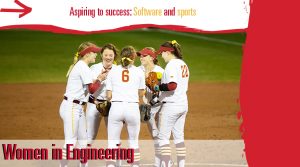
Aspiring to success: Software and sports
Many students in college understand the struggle of balancing schoolwork, jobs, classes and extracurricular activities. Two students in the Department of Electrical and Computer Engineering at Iowa State University, Bailey Righi and Samantha Williams, are strong athletes and juniors in software engineering, balancing track, softball, school and everything in between.
The two students have both been active with sports for almost their whole lives. Righi bounced through many different athletics, like softball, soccer and basketball. Williams was thrown into sports as soon as possible, joining softball at a very young age — and still practicing the sport now.
But in college, it can be more difficult to dedicate as much time to athletics. Moving from high school to college, the academics bring a different mindset. Involvement in both sports and higher education can create a common negative stereotype.
“There is a general assumption that athletes aren’t serious about academics, which isn’t true at all,” Williams said. “People are surprised when they learn that isn’t the case.”
Williams and Righi are both successful students in challenging majors. Yet, they withstand the rigorous schedule of the athlete and engineering life. From sports to software, the two students experience very different cultures. In software engineering, a more professional, group aspect appears. And in sports, it feels more like a family, Williams said.
“With all of the activities I participate in, I get to interact with and learn about so many different people in so many different settings,” Righi said. “To me, that’s what college is all about, and I’m certainly taking advantage of the opportunity to do so.”
For Williams, connections are important to her career in both sports and software engineering.
“I’ve been able to connect with Iowa State alumni who played sports at Iowa State who are working in my field who are eager to help,” Williams said.
In season, the students spend over 20 hours a week dedicated to the sport, while in the off-season, about 8 hours are still dedicated. Although, these hours do not include extra time spent on additional practice time or reviewing past meets. One day off per week is mandatory for the students.
“[Track] takes up my afternoons and evenings five or six days out of the week, not counting the weekends we travel for meets during the season,” Righi said.
They say the balance between school and extracurriculars can be challenging.
“I think the biggest challenges are group work and time management,” Williams said. “Group work is challenging during the season when we are constantly traveling and away from Ames.”
Williams said she combats her lack of availability by always alerting her group members of her tight schedule as soon as she is grouped with them. And she is meticulously completes her homework as early as she can, because there is no guarantee she will have time later.
“I definitely had to refine my study skills once I got to college,” Williams said. “The key things that have helped me are a good weekly planner, starting assignments and projects early and being able to take classes I actually enjoy.”
Williams and Righi both said planners are a helpful tool when balancing the many different aspects of college. Righi uses a planner provided from the organization WiSE (Women in Science and Engineering). Checking assignments off her list is her favorite part, she said.
“I put all my events in my phone’s calendar, and I fill out my planner with all my assignments and tasks to keep track of them and check them off,” Righi said.
But for the students, the time and dedication put toward sports brings a networking aspect valuable in software engineering.
“Through softball, I’ve been able to meet other student athletes for social connections. It’s also a good conversation starter for general social situations,” Williams said. “On a professional side, I often use stories and lessons from softball when interviewing for employment positions.”
In softball, it is very important to lead by example and know how teammates react in certain approaches or tense situations, a skill that can also transfer to the engineering field.
Righi and Williams thrive on the track and on the softball field, but also in the field of software engineering. While the balance may sometimes be challenging, with a plan and some experience, the two juggle it all seamlessly.